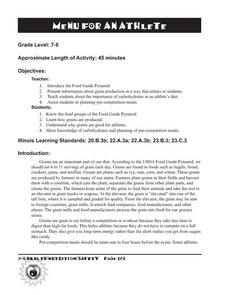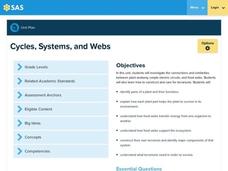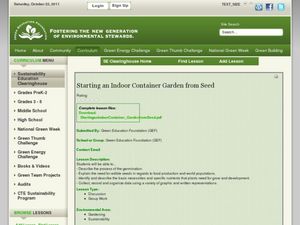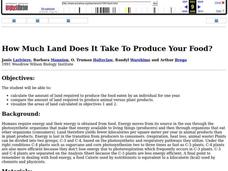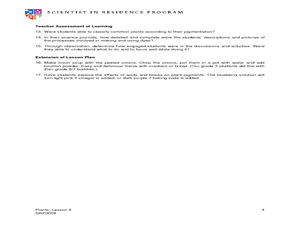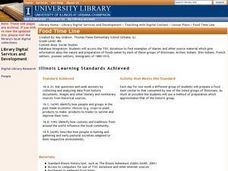Curated OER
Menu for an Athlete
Football, basketball, softball. What do these sports have in common? Athletes. Young scholars learn about and discuss the food pyramind, especially grains, with the thought that they will be planning a pre-competition meal and snack for...
Curated OER
"Cereal" Comic Strip
Young scholars discuss how wheat is important to our everyday lives, from food to insulation, focusing on how wheat grains are processed into food items. Students then create a comic strip of the steps of processing grain to demonstrate...
Kenan Fellows
Attack of the Aphids!
Insects threaten the food production industry, and aphids are one of the big players! Analyzing data of aphid populations gives insight into their behaviors. Learners model the population data of an uninhibited population with an...
Curated OER
Lesson 3: Nutrition, Labeling and Packaging
Students explore basic nutrition concepts to help them select healthy diet, evaluate food intake, discuss major food labeling issues, design labels for food products, examine history of food packaging development and how packaging...
Curated OER
You're Wearing Your Plants!
Students examine the many uses of plants and trees by looking at their clothing. They make lists of products that come from plants and trees and their uses.
Curated OER
Farmers and the Food Connection
Students investigate the process of growing food. In this agricultural lesson, students invite a farmer into their classroom to discuss how they grow and process food. Students participate in learning centers which focus on farming.
Curated OER
Where Does Food Come From?
Students recognize that food we eat comes from farms. In this where does food come from lesson, students discuss planting crops and how they grow. Students plant seeds for edible crops and eat them when are ripe. Students sing a song...
Virginia Department of Education
Photosynthesis and Cellular Respiration
Provide high schoolers with their own indoor gardens! Emerging scientists discuss the process of photosynthesis and germinate seeds before growing plants in multiple lighting conditions. The hands-on application allows pupils to see...
Curated OER
Crops 2: What Plants Need to Grow
Students explore agriculture by participating in a plant growth activity. In this botany instructional activity, students discuss what types of plants grow in their local environment and what the plants need to survive. Students read...
Curated OER
PICTURE PERFECT PYRAMID
Students create a model of the USDA's Food Pyramid Guide, using shoe boxes. They bring an assortment of shoe boxes from home. Students are given a copy of the "Food Guide Pyramid." They wrap boxes for the bread group in white, the...
Pennsylvania Department of Education
Cycles, Systems, and Webs
Fourth graders review the parts of the plant and their functions. In this plant lesson plan, 4th graders recognize that plants must transfer energy to make food. Students understand the interdependence of organisms in an ecosystem.
Curated OER
Starting an Indoor Container Garden from Seed
Students create an indoor container garden. In this container garden lesson, students explore seed germination. Students discuss edible seeds.
Curated OER
How Much Land Does It Take To Produce Your Food?
Students calculate the amount of land required to produce the food eaten by an individual for one year. They compare the amount of land required to produce animal versus plant products. Students visualize the areas of land calculated.
Curated OER
Using Plant Pigments as Natural Dyes
Students create friendship bracelets and quilt squares. In this plant lesson student dye their own string and cotton material with plant pigments. Students use the naturally dyed materials to create the friendship bracelets and quilt...
Curated OER
Green Genes: Genetically Modified Organisms in Our Food
Students investigate how and why genetically modified organisms are used as food crops. They identify the advantages and disadvantages of these crops through internet research then present their views and discuss them as a large group.
Curated OER
Making Pretzels
Students explore how people use plants for food. They use pretzels to see how wheat can be turned into food.
Curated OER
Vegetable Twister
Learners review vegetables and their nutrient values and production. In this vegetable production worksheet, students read information about the nutrients in vegetables and how they are grown. Learners participate in a game of Twister to...
Curated OER
Making Pretzels
Students discover that plants provide food products to humans. For this baking lesson, students grind wheat seeds into flour and then use the flour to make pretzels. Students participate in a variety of activities that involve them in...
Curated OER
Food Time Line
Fourth graders make a timeline to include the immigrants of 1880-1910. Then, in groups, they research foods consumed, purchase, and serve it to the class.
Virginia Department of Education
Go with the Flow
How does nature's hierarchy relate to our local human environment? Answer this question, along with others, as the class visually depicts the natural hierarchy provided by nature. Pupils discuss each piece of the pyramid and its energy...
Teach Engineering
Photosynthesis—Life's Primary Energy Source
Wouldn't it be great if you could produce your own food? Scholars learn about the processes of photosynthesis and cellular respiration in plants. They consider how to use photosynthesis as a model of an efficient system and how to apply...
Curated OER
Kernels of Wisdom: Investigating Natural Variations in Corn
Here is a brain-popper! Corn, or more appropriately, maize, was intentionally domesticated by humans around 9,000 years ago and over a period of hundreds to thousands of years! Genetics and botany researchers have collaborated to find...
Curated OER
Mutualism and Co-evolution A study of Flowering Plants and their Pollinators: Biology, Plants
These lessons use a variety of methods and approaches to teach flowering plant biology which includes seed germination; plant growth and food production through photosynthesis; plant transpiration and respiration; sexual reproduction...
Curated OER
Photosynthesis
Fourth graders discuss and identify the components of photosynthesis and the products of this process. They participate in a class discussion about the importance of oxygen, and in small groups act out the process of photosynthesis. ...


